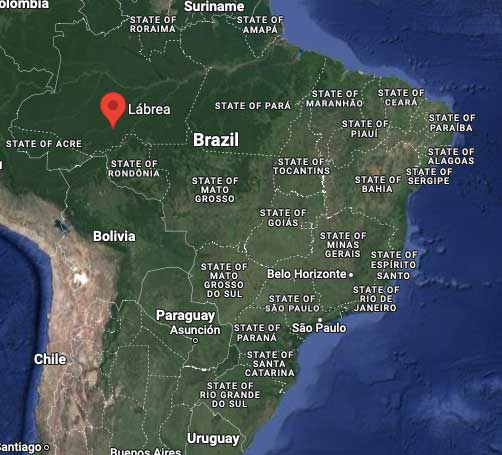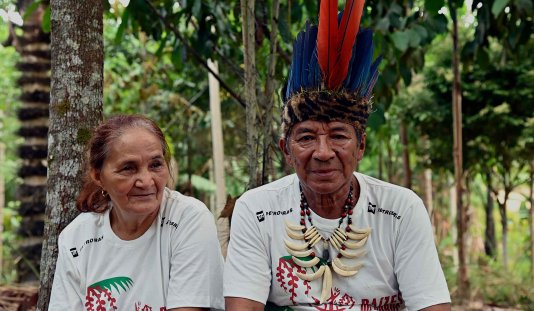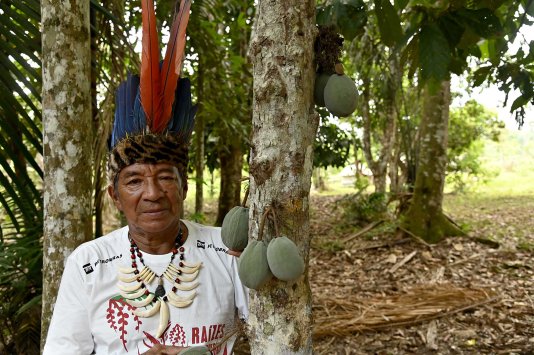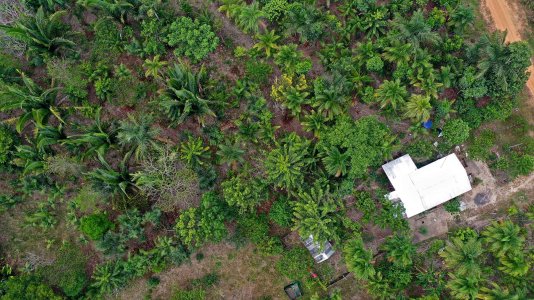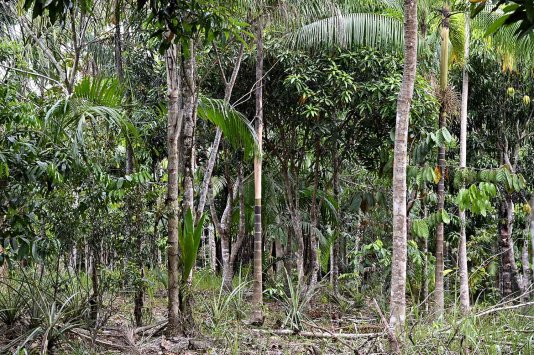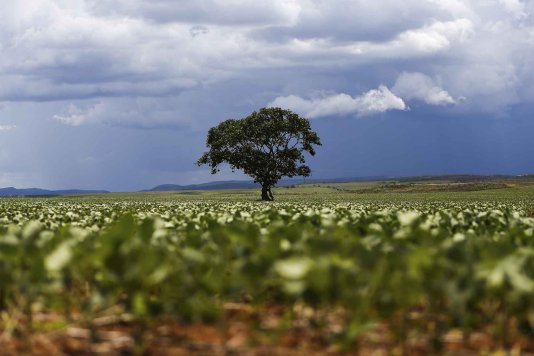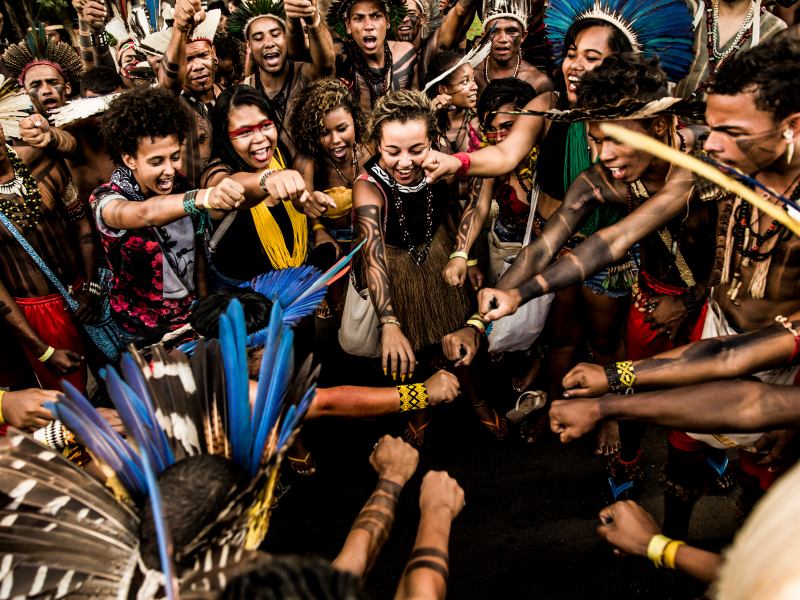- About
- Topics
- Picks
- Audio
- Story
- In-Depth
- Opinion
- News
- Donate
-
Signup for our newsletterOur Editors' Best Picks.Send
Read, Debate: Engage.
| February 22, 2023 | |
|---|---|
| topic: | Sustainable Agriculture |
| tags: | #Sustainable Agriculture, #Brazil, #indigenous people, #food security, #agroforestry |
| located: | Brazil |
| by: | Ellen Nemitz |
Maria dos Anjos, or simply Dona Maria, is a 66 year-old indigenous woman living in the Brazilian Amazon region, near the city of Lábrea.
Although she was born elsewhere, she currently lives with the Apurinã people in the Caititu land where she partakes in a successful Agroforestry System (SAF in the Portuguese acronym) growing different kinds of food and reforesting degraded by large-scale economic activities.
According to researchers, small-family farming techniques in the region were eclipsed over the years by the agribusiness, which often relies on monoculture: the practice of planting or raising only one plant or livestock species repeatedly. This, modern science affirms, typically leads to environmental degradation in the form of soil pollution, biodiversity loss and land erosion.
In an interview with FairPlanet, Dona Maria said that she has always tried to cultivate as many types of fruit and vegetables as possible, wherever she lives. Nonetheless, the Roots of Purus project (alluding to the name of a river) - an initiative of the Operation Native Amazon (OPAN) that was launched in 2013 - now provides a standardised system of plantation.
Seu Marcelino dos Anjos, Dona Maria's husband, who joined us in our conversation, explained that while the project did not add many new types of foods, it introduced a proper way of planning their work.
"We always dreamed of reforesting, but with the arrival of OPAN, within this project, we began to have control [on the results]."
Nowadays, all types of produce grows in their land, from mangos, watermelon, pineapple, oranges, corn, manioc and potatoes to nuts and palm trees. The community cultivates their agricultural produce together, at the right time, while respecting nature and avoiding pesticides.
The result, Dona Maria said, is a rich, nutritious and diverse diet for their families. "Our table is plentiful, natural, there is natural food, without impurity, without chemicals to condemn that food. The SAF is like an income for us, a source of food."
What the village does not consume, it sells. However, just recently they experienced excess production, which is why there is no proper accountability of the revenues so far.
The indigenist at OPAN, Magno Silva, affirmed that organised record-keeping of profit would be the next step of the project. He highlighted, however, that what one can stop spending resources on is just as significant as what they sell. "If you have watermelon, banana, pineapple, gum, for example, you are not buying bread, you know?"
Magno dos Santos reports that the project's initial idea was to reconnect people wounded by the perverse exploitation of their land and work to the very roots of their culture.
"We told them: if you want, we can try to do an experience focused on agroecological systems, on syntropy, on organic products, but very focused on what, in fact, is your own production culture, the rescue of your own old model of plantations," he recalled.
Beginning with four villages, the project now encompasses 21 communities within the Caititu territory - nearly 23 hectares of land - that are at some stage of the SAF development. "We used this tool to be able to contribute with them within this process of seeing the territory as one," dos Santos explained.
It is widely held nowadays that indigenous knowledge can serve as a basis for a more sustainable food system globally. However, for years this knowledge has been stolen and deprived from indigenous communities.
Seu Marcelino remembers a time in which indigenous people were convened to work in rubber production, an industry in which many were killed or worked to death.
"Only [...] some 20 years ago we woke up, we wanted to go back to the knowledge that was our right," he told FairPlanet. "And today we are there. I am the first articulator here in Purus River to pursue health, education and sustainability."
In addition to taking care of her community, Dona Maria is also spreading her knowledge to other communities and for future generations. Indigenous peoples, she made sure we understood, are the guardians of nature: if one tree needs to come down to build a house, she said, ten others will replace it. "Our knowledge is to enrich nature, not destroy it."
Her life's mission, she said, is to take care of nature so that it never ends.
"The family increases, and our knowledge also increases, our forest, our SAF, our wealth. Because working with SAF is an income, it is a source of wealth for us."
Dona Maria and Seu Marcelino have travelled around and learned about different cultures. Each indigenous group is different, she highlighted, and Brazil has nearly 300 different ethnicities living in a wide range of cultures.
Visiting communities of Guarani-Kaiowa villages in Mato Grosso do Sul - a state ravaged by large-scale soy mono-cropping, Dona Maria was struck by both the beauty of their customs around food planting and consumption. "I found it very beautiful that at meal time they gather around and say their prayers before eating," she said. "If it is a seed for them to plant, they also get together in the same way and bless that seed."
She added, however, that there was an and evident lack of support and mobilisation to implement agroforestry techniques in their communities.
"Their land there is good, but I think that they do not have the knowledge that we have here [due to the SAF project]," she said. "They have almost no plants, they have almost no things planted. They could, with the [natural] wealth they have, live much better."
"[There's] a lot of wealth," she continued, "a lot of vegetables. Just from those vegetables, just from there they would get something to survive, to have a full table, without having to spend money."
Dona Maria and Seu Marcelino carry good memories from these cross-border experiences, and now see the seeds brought to their territories - a mutual exchange of maize, beans, peanuts, fruits and vegetables, among others - grow abundantly. And although pressure from farmers who want to invade their territories is unfortunately common, they do not give up on their dream of reforesting the entire area and providing their people with education, health and a dignified life.
"These three things [sustainability, education, and health] have to be [considered] together," Seu Marcelino said. "Because if you do not eat well, you will not be healthy. If you do not have education, you are not going to have perfect health either."
Image by Adriano Gambarini.
By copying the embed code below, you agree to adhere to our republishing guidelines.
